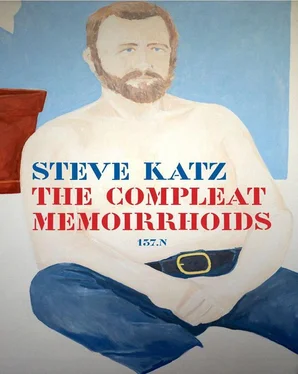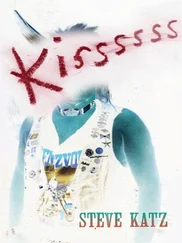At the reception after the readings Baxter introduced me to Thomas Pynchon. “Beautiful poetic prose,” said Pynchon. This was well before he had ascended on his V . to early immortality. It made me uncomfortable, and without a response. “Beautiful poetic prose.” I know that was probably intended as a compliment, and I don’t understand why I felt so put down.
It was a gorgeous late Spring day on the hill in Ithaca, New York. Such an exuberance of lilacs everywhere. Schimmel and I blew out of the reception, sprinted across Taughannock Boulevard, down the hill, past Goldwin Smith Hall, across the Quad, as we took off as if flying on words into the perfumed air.
Harry Lewis warned me before I headed for the job at the University of Colorado. “Watch out for Ed Dorn. He’s anti-Semitic.” Wow, thought I. And an important poet too, the author of Gunslinger . At the first meeting of the Creative Writing Wing I looked for something to support Harry Lewis’s claim; after all, Lewis was fixing himself to become a therapist. Come to think of it, I’ve always been anti-Therapic. Nothing I heard ever supported Harry’s claim. Ed performed as a provocateur. He sometimes said outrageous things — could be anti-Semitic, anti-Rastafarian, anti-Croatian, anti-Minoan, anti-Midwestern, just to shake up the room and rock the conversation. Maybe Harry Lewis caught him doing one of his turns on Israel or Norman Podhoretz. Ed was always present and ripping. You could never forget he was in the room.
It suddenly came to me that we had read together once in New York City, at the series Paul Blackburn ran at Le Metro café on Second Avenue between Ninth and Tenth. Out of that series Paul organized The Poetry Project, that moved to St. Mark’s in the Bowery, and survives today. Le Metro is long gone. The event was a rich experience for me, to read in New York for the first time, to break through the carapace of insecurity and self-doubt, to say to Second Avenue, “I am a writer, and these are my words.” I don’t remember what I read, or what Ed read. He was ten years more experienced than myself. I remember his presence, a craggy eminence in the room. Ed preferred to be “the other,” presenting himself as iconoclast. He wouldn’t bend his knee for the Naropa scene in Boulder. He was scholarly but never conventionally “academic,” though he did float his family on a modest academic salary.
I felt closest to Ed and Jenny when I was living with Linne. Jenny was Ed’s wife, mother of two of his kids, a beautiful, smart, spunky filmmaker, poet, biographer. She was younger than Ed, and that made my relationship with Linne seem licit and possible. Linne was my autumn-spring love affair that went on for almost three years, delicious while it was hot, but inevitably doomed. She was from Alabama, her father the former mayor of Birmingham, president of the University of Northern Alabama. As a child she was bounced on George Wallace’s knee. She grew up with the UNA mascot in the barn across the road from her house. That mascot was an African lion she would visit almost daily. How could I measure up to that? Linne’s ability to carry herself with grace and dignity among people twice her age was a gift derived from her southern upbringing. She had poise. She understood manners. I mistook that grace and ease for maturity.
She busted out of our ménage like a teenager quitting school for the summer, and returned to the South. She met a lawyer back in Alabama and wrote in a letter that he was an atheist who owned ten acres of cotton. “There is nothing as beautiful,” she wrote, “as looking across a field of cotton in the morning light.” “I’ll bet,” I thought, grieving, aching. Though I’d anticipated this rupture, that foreknowledge didn’t make it less painful.
I read the letter to Ed and Jenny over dinner at their house on Mapleton hill. Sitting at their table in the fog of my misery, I felt the cold weight of north light from their dining room window pressed down on my neck. “An atheist with ten acres of cotton.” Ed pondered that briefly, his eyes narrowing, an expression on his long face wickedly Southern Illinois and Lincolnesque. “If he had a thousand acres he’d believe in God.” “Right,” I laughed. With that crack my grief flew out the door. Suddenly laughter, like a sword, had split the fog and everything came clear. I could breathe through my self-pity. I remember Ed forever in this memoirrhoid for the charity of that provocation.
John was the mule-skinner for the Clearwater camp. Only a few men were left who could handle a train of pack mules. He was a rugged, wiry, taciturn man, of indeterminate middle age, who paused occasionally only to roll a cigarette. The Eagle Lookout, where we were booked to work three months of the summer was a five hour ride from the nearest logging road. John rode ahead of his pack train, and Jingle and I followed, myself on a horse, Jingle on a mule. Though she was from Nevada, and her brother was a professional rodeo cowboy, she had no love for and some fear of horses. Mules are more sure-footed, and some of the terrain was rough. I was from New York City, and sometimes feared elevators, but had little experience of horses. We arrived without incident, saddle sore and tired, but happy to unpack and store our clothes and supplies in the efficient twelve by twelve lookout room. We lifted the shutters and were surrounded by a 360 degree vision of the mountains of the Clearwater national forest.
Our job on the tower was to track thunderstorms, record and report strikes, and I was to go out and start fighting any fire within a mile or so from the tower, until the base camp could call in some smokejumpers, or get a crew to cut in by trail. The tower was grounded to attract to it any lightning from storms passing overhead. We were supposed to stand on an insulated stool while the bolts sizzled through the grounding wires that spiraled down the tower. We heard stories of lightning that opened all the cans in storage and flash cooked the contents, that seared any fresh meat in the screened cupboard to well done. We had plenty of trouble getting both of us onto the insulated stool built barely large enough for one. When a lightning storm came through at night the strikes would wash off the raised shutters in a hallucinatory light show, cascades of blue of green of yellow electric.
The animal I feared most in this Clearwater National Forest was a doe with twin fauns. A black bear regularly visited our garbage pit, but it would skedaddle with a peanut butter or jam jar in its mouth, whenever it got a glimpse of us, and would usually discretely replace the lid of the pit. An occasional porcupine waddled across. Because they destroyed young pine trees, and gnawed tires to get the salt, we were encouraged to kill them. Elk were poor neighbors. They assembled at 4 a.m. around the tower to lick up salt from our urine. Elk are very gabby and they kept us awake. We had no wild mountain goats on our side of the river, but once we heard the guy on the Black Mountain Lookout, from the other side, say over the open mike, “I wonder if I can feed these wild goats?” No problem. From then on, at the crack of dawn, we heard the wild goats newly domesticated, bleating for food, and the cursing of our brother lookout.
This doe, however, was terrifying. To get water I had to hike a mile and a half down from the top of the mountain to a spring, fill the ten-gallon water bags, and pack them back up. We learned to conserve water. Usually Ozark, a small, feisty, black and tan mutt, a lot of terrier in the mix, whom we’d picked the year before, from a basket of pups in Ozark, Missouri, would accompany me on the walk. He lived for moments like when I lifted the lid of a grain barrel in the shed next to the tower, and revealed a large brood of kangaroo rats that scattered through the shed and out the door, to Ozark’s delight. He wasn’t afraid to chase bear, elk, whatever lurked in the woods.
Читать дальше












